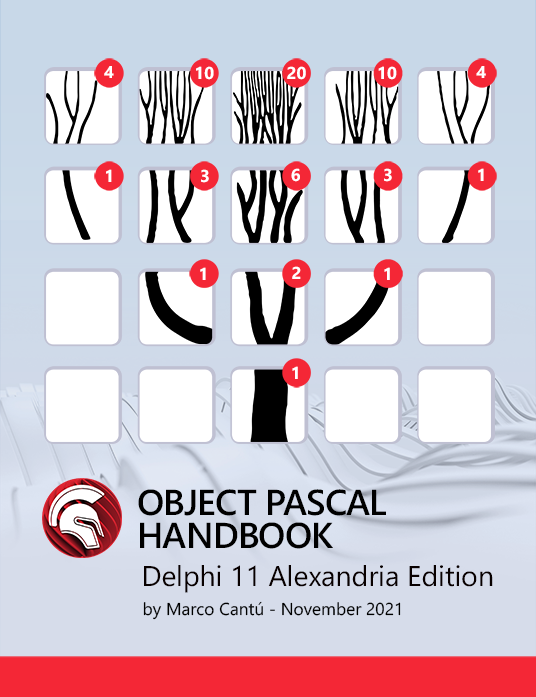
1995 is a very important year in the history of Delphi. On February 14 of that year the first version of Delphi was released for 16-bit Windows 3.1 as a Rapid Application Development (RAD) tool.
Delphi came as a departure from its predecessor, Borland’s Turbo Pascal for Windows. Turbo Pascal combined an editor, debugger, compiler, linker, and libraries, and evolved into Object Pascal after support for objects was added. Delphi / Object Pascal created a foundation for app development that still inspires and supports application developers today.

Henceforth Thou Shalt Be Known as “Delphi”
Where did the Delphi name come from? The accepted story is that the Delphi name was originally suggested by then Borland developer Danny Thorpe as a reference to the Greek fortune-telling temple of the same name. One of the goals behind Delphi was to provide database connectivity to developers, and because Oracle was one of the more popular database products of the time, the reasoning was that “if you want to talk to the Oracle, you have to go to Delphi”.

It just happened, however, that Borland was preparing to release the product as Borland AppBuilder, but when Novell AppBuilder was released shortly before Borland’s own release date, the company moved forward with the amazing iconic name of Delphi. The rest, as they say, is history.
The first version of Delphi came with a Visual Component Library (VCL), visual two-way tools, a Runtime Library (RTL), data-aware components live at design time, a Property Method Event (PME) model, structured exception handling, and Database support via BDE and SQL Links.

Where Was The World in 1995?
What kind of year was 1995? Do you remember where you were in your life that year? I for one was halfway through architecture school. Here are some of the highlights:
After landing in Saskatchewan, Canada, Steve Fosset became the first person to fly solo in a hot air balloon across the Pacific. The Schengen Agreement went into effect for the first time, and more than 170 countries agreed to extend the Nuclear Non-Proliferation Treaty.
Meanwhile, a lot was happening in space, too. Russian cosmonaut Valeri Polyakov completed a record 366 days in space, while Bernard A. Harris Jr. became the first African American and Michael Foale became the first Briton to walk in space. In December, NASA’s unmanned probe Galileo captured the world’s imagination with pictures as it entered the atmosphere of Jupiter.

Entertainment
Hollywood was busy as always, and the year saw the release of Kevin Costner’s Waterworld, David Fincher’s crime thriller Seven, with Brad Pitt and Morgan Freeman, and Toy Story, the first-ever full-length computer animated film.
Other high-profile movie releases included Batman Forever, and the James Bond thriller Goldeneye. Forrest Gump won the Oscar for best film. Alanis Morissette released Jagged Little Pill, Shaggy released Boombastic, and rapper Coolio released Gangsta’s Paradise.
Browsers, Games and The Internet
Microsoft released Windows 95, Visual Studio 4.0, and Internet Explorer 1 and 2. Interestingly, the first version of the Opera browser was also released in the same year, as was Netscape Navigator 2.0.

HTML was also at version 2.0, and after the US Government ended funding for The National Science Foundation Network (NSFNET), the Internet became a privatized system. Sony released its first game console, the PlayStation, and gamers enjoyed the release of FIFA Soccer 96.

1995 Was The Year Delphi Changed App Development
The image below is Delphi’s Factsheet from 1995. A quick look reveals that many of the innovations that made Delphi so transformative for application development remain equally powerful value propositions today, which suggests many of the problems Delphi solved at the time, it still solves today. That may be due both to the commitment to the evolution of Delphi over the years by its pioneers, champions and fans, and the persistent absence of convincing alternatives.

In 1995, Delphi, as the factsheet says, was “the only Windows development tool to combine the Rapid Application Development (RAD) benefits of visual component based design with the power of an optimizing native code compiler and scalable database access”.
Given that these very capabilities – single codebase, multi-native compiling, super-fast time-to-finished-product – are as valuable today as they were twenty-seven years ago, the choice of name suggests something more prophetic than coincidental, a profound insight into the future of app development that embodies the mythical origins of its name, Delphi.
The Delphi 27 Anniversary Webinar
Delphi’s birthday is coming! Join Embarcadero’s Marco Cantu, David Millington, Jim McKeeth, Delphi MVP Ian Barker and special guests on February 14th as they mark Delphi’s birthday in our Delphi 27 Anniversary Webinar! Don’t miss out! Register here, or click the image below:
The Delphi Innovation Timeline
Another way we’ll be marking Delphi’s anniversary will be the publication of the Delphi Innovation Timeline, a visual exploration of the technological innovations that have occurred in every year of Delphi’s evolution since 1995 that includes the evolution of computer languages, game consoles, browsers, operating systems, smartphones, and much more.
Stay tuned to our blog as we build up to the anniversary and the release of the The Delphi Innovation Timeline!
Design. Code. Compile. Deploy.
Start Free Trial Upgrade Today
Free Delphi Community Edition Free C++Builder Community Edition







I was using turbo basic and then turbo pascal around 1990. I remembered the ad for turbo basic featuring a programmer’s ire about his wimpy v****basic (title partially covered) and superhero flying through the window with turbo basic.
A friend “lent” me his copy of Delphi One and I was hooked. Bought Delphi two when it came out (96?). Now on subscription.
I picked up a free copy of Delphi1 together with magazine. I tested it and noticed that it solved a number of things I had been trying to get to work in Visual Basic. So with Delphi I created a SGML-editor for our new editorial system. I was also working as a journalist and wrote the first published text in my own editor. It was put into production for us in 1998 and is still being used by the sports departement. Upgraded of course. Running in a Delphi 2007 version now.
Still got the ‘Borland Delphi for Windows Object Pascal version 1.0’ book on my shelf and Delphi 5 installed on a couple of 32bit machines (for some 16bit code!).
I started on Turbo Pascal on an IBM PC Junior back in the late 80s because I knew FORTAN but hated BASIC (remember the old “GOTO 500” comic with the programmer standing on King Arthur’s Round Table?). Kept updating all these years because of NSol!, a program I have sold for 28 years. I am now messing with Python4Delphi on Delphi 11.
The help system of Delphi 1 was incredibly complete and with examples.
Hey, I was there too – got my first copy of Delphi in April ’95 and kept cranking on it until 2006 (had to start doing “web” stuff). For me, it truly was “the VB killer” (thanks Anders for C#, btw).
J’ai commencé le Pascal sur mon Amstrad 6128 avec Turbo Pascal ! Puis dès que j’ai eu un pc en 1989, j’ai eu Turbo Pascal (jusqu’au 6 si mes souvenirs sont bons), puis un jour j’ai eu Turbo Pascal Objet, qui changeait radicalement la manière de programmer : que de lignes à écrire pour produire une fenêtre ! Dès que j’ai appris la sortie de delphi 1 je l’ai pris puis j’ai sauté delphi 2 pour acheter delphi 3 à titre personnel et pour le boulot avec lequel j’ai longtemps travaillé. Puis Je suis passé à titre perso sur Delphi 2005 (sans les composants BDE), et un jour j’ai découvert Delphi Community Edition qui me suffit largement pour faire des programmes personnels. Que de chemin parcouru …
Delphi arrived at just the right time for me. My team needed a tool to build internal Windows tools with many, many Add/Edit database data type of screens. Doing the same work in C++/MFC, our chosen platform for most things, would have taken multiple times longer and required a different set of developers than we had available.
As an aficionado of Turbo Pascal, I knew the power and developer-productivity focus of the tools Borland produced, and had long known the approachability of the Pascal language. it was an easy leap to decide that Delphi was the right tool for the job.
Some of those tools still exist and are in active use today.
As someone who’s used many development platforms and languages over my 40+ years of development including Apple and TRS-80 BASIC, Mainframe COBOL, AS/400 RPG, DOS Turbo Pascal and Turbo C++, Microsoft C++/MFC, Java and 20 years of C#, I still say that Delphi is the most productive interactive-app development tool I’ve ever used.